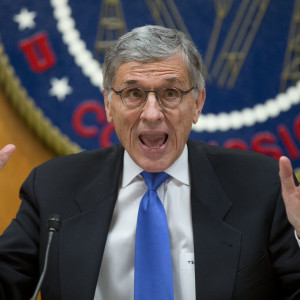Citing possible links between terror-related websites and online communications and Friday’s attacks on Paris, FCC Chairman Tom Wheeler suggested Tuesday Congress give the agency more authority to use ‘big data’ to monitor and act on potential threats.
Appearing at a hearing held by the House Energy and Commerce Committee, the Federal Communications Commission chairman told lawmakers that updating a 1994 law could give the agency more power to assist law enforcement and intelligence agencies in the surveillance of terror suspects online.
“We just had this terrible attack in Paris, and hundreds of people were killed,” Texas Republican Rep. Joe Barton said during the hearing. “We need to do something about it. ISIS and the terrorist networks can’t beat us militarily, but they are really trying to use the Internet and all of the social media to try to intimidate and beat us psychologically.”
Barton described the threat of ISIS as “a clear and present danger,” and asked commissioners if there was anything the FCC could do to tamp down the spread of Islamic extremism and radicalization online.
“I would think that even in an open society, when there’s a clear threat — they’ve declared war against us, our way of life, they’ve threatened to attack this very city that our capitol is in — that we could do something about the Internet social media side situation,” Barton said.
“I’m not sure that our authority extends to picking and choosing amongst websites, but I do think there are specific things that we can do,” Wheeler told the House Communications and Technology Subcommittee.
Barton asked if Congress should give the FCC additional authority to allow the agency to “shut those websites down.”
“One of the issues here is the question of, ‘What is a lawful intercept?’ … Something the Congress can define,” Wheeler responded. “You did it in CALEA [Communications Assistance for Law Enforcement Act], things have moved on since then.”
Under CALEA, passed in 1994, Congress mandated telecommunications companies build into their networks the technology necessary to facilitate intelligence and law enforcement agency surveillance, which at the time was limited to telephone wiretapping.
“You read in the press that they were using PlayStation 4 games to communicate on, which is outside the scope of anything ever considered in CALEA,” Wheeler added. “And so there’s probably opportunities to update the lawful intercept concept.”
RELATED: NYT Quietly Pulls Article Blaming Encryption in Paris Attacks
“I think there’s also a question about the security of our networks,” Wheeler said. “There have been 17 fiber cuts in the Bay Area in the last few months mysteriously happening.”
The chairman added there were two additional fiber cuts just yesterday, though not in the San Francisco area. The fiber cables described by Wheeler make up crucial portions of the Internet’s global infrastructure, carrying data underneath oceans to connect major online hubs like the EU and U.S.
“We need to have some kind of a big data capability of determining what’s happening to our network out there, because it’s not just people getting on the network, it’s perhaps people doing things to the network,” he added.
The FCC is currently the only agency capable of reporting network outages via its Network Outage Reporting System (NORS) — a system Wheeler said is vastly underfunded, outdated, and could potentially be used to collect and analyze “big data” to aid law enforcement and intelligence agencies.
“We don’t have the ability to use that to go for big data, to have big data analysis,” Wheeler explained. “It’s barely holding together with baling wire and glue because it’s using ancient technology. We’ve been asking for appropriations to upgrade that.”
Wheeler didn’t elaborate on what forms of data that could entail, or in what facets it could be used to aid in defense beyond protecting physical fiber networks.
“This experience has called out the importance of network security, and if we can’t connect the dots … ” Wheeler continued, “You know after 9/11 we kept hearing, ‘we couldn’t connect the dots.’ We have the ability inside our systems to use big data, connect the dots, but we don’t have the capacity to do it.”
Wheeler pledged to would work with the committee on updating laws that would allow the FCC to aid agencies in defending against potential terrorist threats.
California Democratic Rep. Anna Eshoo pointed out the FBI has already acknowledged it needs to work the House Permanent Select Committee on Intelligence on investigating fiber cuts.
The agency announced in July it was investigating the cuts described by Wheeler, which disrupted Internet service to business and residents in the San Francisco Bay Area.
“I don’t think this is coincidental either,” Eshoo added.

